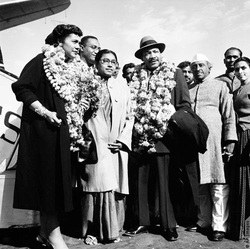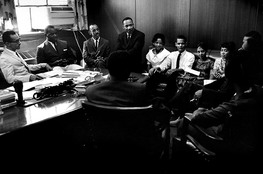Influence

_Through a sermon by the president of Howard University, Dr. King
first became familiar with Mohandis Gandhi. From then on, he became very knowledgeable about his theories. Dr. King called Gandhi's philosophy of nonviolence the "only logical and moral approach in the struggle of justice and progress." Although it took Gandhi over twenty years to accumulate his wisdom, many believe that Dr. King assimilated the views of the great philosophers, like Thoreau, Buddah, Ruskin, Tolstoy, and Christ, in his 32 years of living.
As Dr. King progressed throughout the Civil Rights Movement, he was quoted saying that Mohandis Gandhi was ‘‘the guiding light of our technique of nonviolent social change’". Dr. King was so inspired that, in early 1959, he toured India, meeting with Indian officials and Gandhian activists. Just under four years after his first major act of nonviolence, word had spread throughout India about Dr. King's efforts to insure justice. Dr. King was respected highly. His experience played a significant impact with his commitment to ensuring justice through the theories and techniques of nonviolent resistance, as shown in the following quote. "Since being in India, I am more convinced than ever before that the method of nonviolent resistance is the most potent weapon available to oppressed people in their struggle for justice and human dignity."
As Dr. King progressed throughout the Civil Rights Movement, he was quoted saying that Mohandis Gandhi was ‘‘the guiding light of our technique of nonviolent social change’". Dr. King was so inspired that, in early 1959, he toured India, meeting with Indian officials and Gandhian activists. Just under four years after his first major act of nonviolence, word had spread throughout India about Dr. King's efforts to insure justice. Dr. King was respected highly. His experience played a significant impact with his commitment to ensuring justice through the theories and techniques of nonviolent resistance, as shown in the following quote. "Since being in India, I am more convinced than ever before that the method of nonviolent resistance is the most potent weapon available to oppressed people in their struggle for justice and human dignity."
_"We
must use the weapon of love. We must have the compassion and
understanding for those who hate us."
- Dr. King, "Pilgrimage to Nonviolence"
- Dr. King, "Pilgrimage to Nonviolence"
Strategy

"The
nonviolent strategy has been to dramatize the evils of our society in
such a way that pressure is brought to bear against those evils by the
forces of good will in the community and change is produced." - Dr.
King (May 4, 1966)
The quote above summarizes Dr. King's main purpose for nonviolence. For nonviolence to be successful, he considered it mandatory for nonviolent participants to have an understanding of the philosophy and principles of nonviolence resistance. He believed that "teaching both the theoretical aspects of non-violence as well as the practical application" was the understanding way for this to be achieved. Resisting violence with nonviolence is only achieved through understanding the philosophy and principles of nonviolence.
The quote above summarizes Dr. King's main purpose for nonviolence. For nonviolence to be successful, he considered it mandatory for nonviolent participants to have an understanding of the philosophy and principles of nonviolence resistance. He believed that "teaching both the theoretical aspects of non-violence as well as the practical application" was the understanding way for this to be achieved. Resisting violence with nonviolence is only achieved through understanding the philosophy and principles of nonviolence.
Opposition
__"The concept of nonviolence is a
false ideal. It presupposes the existence of compassion and a sense
of justice on the part of one's adversary. When this adversary has
everything to lose and nothing to gain by exercising justice and
compassion, his reaction can only be negative." - George Jackson, Black Panther Party
Huey Newton, a co-founder of the Black Panther Party, argues against strategies of nonviolence. He questions, "what good, however, was nonviolence when the police were determined to rule by force?" Malcolm X, a well known human rights activist, completely rejected the theory of nonviolence. He is quoted saying, "I believe it's a crime for anyone being brutalized to continue to accept that brutality without doing something to defend himself." |
Responses
__Dr. King believed that his theory of nonviolence did not play into the hands of white oppressors, for demonstrations like the Freedom Rides or the Bus Boycott would certainly not make these extremists and reactionaries in the white community feel comfortable.
"I must continue by faith or it is too great a burden to bear and violence, even in self-defense, creates more problems than it solves." - Dr. King (May 4, 1966) Dr. King characterized Malcolm X's "call to arms" as "ineffective and immoral". Violent riots, outbursts against oppression and discrimination, Dr. King believed, were often unplanned, uncontrollable, and unsuccessful. As Malcolm X refused to accept principles of nonviolence, he made Dr. King seem more moderate, thus making Dr. King more effective in combating the injustice of racial discrimination. |
